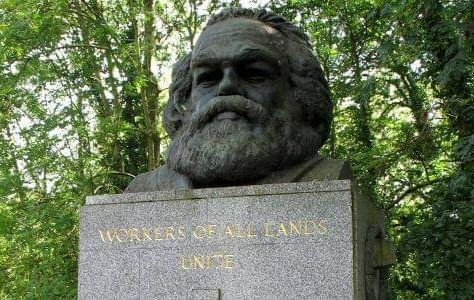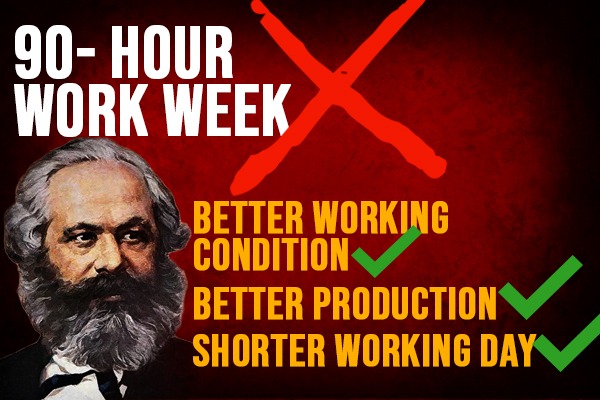Karl Marx is one name in the modern world that transcends national borders and social, political, religious barriers having influenced humanity like no one else before in the history. In the world politics Karl Marx is either supported or opposed. Marx is the hero of a group of people who wish to go for the socialist path of development and a big target for attack by the people speaking on behalf of the corporate world. Marx matters!
The great document brought jointly by Marx and Engels, “Communist Manifesto” in the year 1848 had shaken the conscience of the world. It created fear in the minds of the capitalists while on the other hand it created millions of rays of hope for the poor and exploited class of the world. For ever after that the capitalist class has been living in the fear of an impending revolution by the proletariat. It is this fear that has compelled the bourgeoisie governments of many nations to adopt social welfare policies, lest the revolution happen as declared in the “Communist Manifesto”!
Karl Marx was born on 5th May 1818, in the German (then Prussia) town called Trier. In his university days he was influenced by the idea of dialectics given by the famous German philosopher Hegel. Later, he went on to develop the idea of dialectics of Hegel and propounded the theory of Dialectical Materialism. Marx’s methodology was very scientific and hence had an element of universality like other areas of science.
Marx studied the whole structure and working of Capitalism and wrote the world famous book ‘The Capital” (Das Capital in German). He explained the fundamentals of the process of production since the beginning of human civilization to the modern age. As the production relations changed, the structure of the society changed, he explained. Scientists agree that the changes in the tools reflect changes taking place in human society. Marx brought out the relation between the commodity production and the development of human society –
“A commodity reflects the stage of development of the society in a nutshell”.
The supreme role of human labour in shaping the journey of human civilization was very effectively put forth by Marx. He talked about the labour power and the theory of surplus production created by the labour power. He was successful in demystifying the reasons for the poverty of majority and the richness of few in the society.
Marxism has three main components: Marxian Philosophy, Political Economy and Principles of Communism.
Marxian Philosophy can be further divided into three parts: Dialectical Materialism, Historical Materialism and Principles of knowledge. Political Economy’s Components are: Theory of Production, Base and super structure, Changing Production Relationship and Theory of Surplus. In Principles of Communism, Marx writes about Classless society, Use of the Surplus value created, and World Communism.
Marxism in a nut shell –
- Marxian Philosophy
- Dialectical Materialism – Materialist explanation of why things happen.
- Historical Materialism – Theory of social evolution of the Human /society
- Principles of knowledge – Theory of Cognition and understanding the world
- Political Economy
- Theory of Production – How human society is different from the animal world. Components of production and the changing Production Relationship
- Base and Super structure – Economic relations ( i.e Production relations) make the base. Religion, Linguistic groups etc make the superstructure. The social relations that make the society
- Theory of Surplus – How the Labour creates the surplus which becomes the reason for the progress of the society.
- Principles of Communism
- Classless society – No Masters and no have-nots . Social ownership of the means of production. Removing the roots of all exploitation
- Use of the Surplus – The theory of wealth distribution
- World Communism – Scientific revelation that all human beings are equal. They have all the same genetic makeup, demands that a border-less world is in the interest of humanity A modern world working for the welfare of all citizens
When we look at the vast spectrum of Marx’s writings, we can easily understand that Marx was a Social Scientist, a theoretician and an economist. He wrote on all aspects of human life. Being a materialist philosopher he based all his writing on material evidence. The famous booklet “Communist Manifesto” was written by Marx in the year 1848, when he was just 30 years old. His theses on, ‘Political Economy’ brought an avalanche in the world, breaking all hitherto understanding about poverty and richness. For the first time people got to know the real reasons for their poverty.

Marx on Religion
Marx is often pitted against religion, as if he was an anti-religious philosopher. This is far from truth. Marx was a materialist philosopher like many scientists. All his writing is based on material evidence. Naturally he keeps metaphysics away from his research and writing. Yet he has rightly analysed the religious aspects of a workers or peasants life. In the situation of helplessness, where else could an exploited citizen go!
“Every true philosophy is the quintessence of knowledge of its own time!”
– Karl Marx
Here is Marx is acknowledging the role played by the religious philosophies in the development of human society. The efforts of each religion that emerged from time to time have definitely contributed to the development of society in some or other manner.
“Religion is the last sigh of the oppressed. The heart of the heartless world. The soul of the soulless.”
– Karl Marx
Again Marx has analysed the role played by religion in comforting the exploited peasants and the workers in a world that is absolutely heartless about the suffering of the real producers and creators!
“Religion is the opium of the masses!”
– Karl Marx
This one quote has been used in isolation again and again to malign Marx and put him against all the religions and religious institutions. When we look around our own world we realise that when religion is used and misused by the political leaders, it does become the opium of the masses. The real issues are relegated to the background and the people belonging to different religious groups indulge in mindless confrontation which suits the political class to their best advantage. Marx has long back warned the working class against this kind of disunity that destroys their power to fight against exploitation.
Marx on India
Marx wrote about my country also. He was the first person to call the 1857 revolt, “India’s first war of Independence”. He also wrote that the railway lines being laid by the British Empire in India will dig its own grave one day. Marx called India’s dreaded caste system as the ‘Frozen Class’, meaning no change is possible in this system where the status of a person is decided by his/her birth.
FINALLY…
Living in penury all his life Marx created hope for the millions of poor workers all over the world. He gave hope to the hopeless when he wrote in the Manifest:
“Workers of the world unite! You have nothing to lose but the chains of hunger and poverty and a world to win!”
Along with being a Philosopher, Marx was an activist also. He was instrumental in organising the first International organised in the year 1864. He participated in many demonstrations demanding justice to the working class. He was concerned about the social well being of the downtrodden and the powerless. He believed that the existing world order and the production relationship can’t do justice to the working class. A new society is needed to be built to give justice to all.








